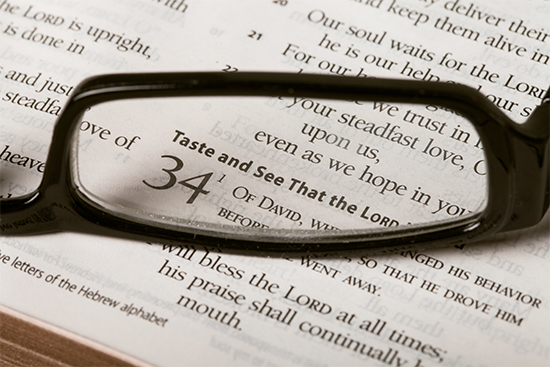
June-July 2021
Everyday Heroes
------------------
|





INTERSECT: Taste and See That the Lord Is Good, Part 1
Psalm 34 is beautifully written. A psalm of thanksgiving, it is a splendid example of Hebrew poetry, written as an acrostic of the Hebrew alphabet. Each line begins with a successive letter of the Hebrew alphabet, beginning with ? and ending with ?. It is a wonderful reminder God has not only revealed Himself to us in straightforward prose, but also in skillfully constructed poetry. The beauty of the composition is matched by its moving content, as the psalmist invites listeners in verse 3: “O magnify the LORD with me; and let us exalt his name together.”
The psalms lift our spirits to the heights in calling for songs of loudest praise, but also meet us in times of need, binding the wounds of broken hearts and crushed spirits. In his book Out of the Depths, Bernhard Anderson points out “these songs are sung by people who, after a time of patient waiting (see Psalm 27:13-14), have experienced the goodness of God in the everyday world.”
Over the next two Intersect columns, I will focus particularly on verses 6-9. In these verses, David reminds us the Lord is attentive to the cries of the poor and downcast. He hears them and is attentive to their needs. In our lowly estate, we are able to experience the goodness of God. Such poverty reminds us we must fear Him and walk carefully according to His will.
The Lord helps the humble (verses 6-7). This poor man. The statement, “This poor man cried out and the LORD heard,” refers to the moment in the not too distant past when the psalmist experienced deliverance from God. He cried out to the Lord, the Lord answered him, and delivered him from his distress. We don’t know the specifics, but the psalms are often general by design. We can all identify with distresses of various kinds, and the truth of Scripture reminds us we must wait on the Lord for strength (Psalm 27:14) because He does hear us and will answer us according to His will.
The angel of the Lord. In the Old Testament, the angel of the Lord often signified the presence of God among men. As Abraham welcomed three guests into his home in a show of hospitality, one was the angel of the Lord. Two of the messengers went on to judge Sodom and Gomorrah, but the other lingered with Abraham. In the passage, Abraham interceded to the Lord on behalf of his nephew Lot. The angel of the Lord is the presence of the Lord himself! The angel of the Lord’s encampment among His people reflects Israel’s wilderness journey to Canaan, the land
of promise.
In Exodus 14, God led the Israelites through the Red Sea, as though on dry ground. Just before Moses stretched out his hand over the water to divide it, we read, “And the messenger of God going before the camp of Israel set out and went behind them, and the pillar of cloud before them set out and stood behind them” (Exodus 14:19). The context of this passage is rescue from Egyptian bondage: the messenger going before the camp of Israel to lead them out of Egypt moved behind them to form a protective barrier between them and Pharaoh’s army. Actually, this created a double barrier. The pillar of cloud remained stationed behind, while the messenger moved along behind the camp of Israel.
Again, we read in Exodus 23:20: “Behold, I am sending a messenger before you, to guard you on the way, and to bring you unto the place that I have established.” Here, the messenger is the means of leading God’s people along the way to receiving the land of promise, “the place that I have established.” In both contexts, the Lord was with His people. Once the tabernacle was completed, we read:
Then the cloud covered the tent of meeting, and the glory of the LORD filled the tabernacle. Moses was not able to enter the tent of meeting because the cloud had settled on it, and the glory of the LORD filled the tabernacle. Throughout all their journeys whenever the cloud was taken up from over the tabernacle, the sons of Israel would set out; but if the cloud was not taken up, then they did not set out until the day when it was taken up. For throughout all their journeys, the cloud of the LORD was on the tabernacle by day, and there was fire in it by night, in the sight of all the house of Israel (Exodus 40:34-38).
Jesus, the Word made flesh, “tabernacled among us, and we saw His glory, glory as of the only begotten from the Father, full of grace and truth” (John 1:14). And we, the church, have now become the temple of the Holy Spirit (1 Corinthians 3:16; 6:19; 2 Corinthians 6:16). In 2 Corinthians 6:16, Paul quoted from Exodus 29:45 to connect the tabernacling of the Holy Spirit in believers: “I will dwell in them and walk in them; and I will be their God, and they shall be my people.”
The angel of the Lord encamps among His people!
About the Columnist: Dr. Matthew McAffee is provost and professor of biblical studies at Welch College: mjmcaffee@welch.edu.
|
|

